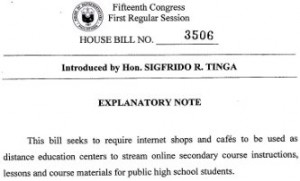HB 3506: I-Cafés As Distance Education Centers
 There is now a proposed measure in the House of Representatives aimed to require internet shops and cafés (i-cafés) to be used as distance education centers (DECs) to stream online secondary course instructions, lessons and course materials for public high school students. House Bill No. 3506 (HB 3506) was authored by Rep. Sigfrido R. Tinga and shall be known as “Distance Education Centers Act of 2010” when enacted into law. The bill is now with the Committee on Basic Education and Culture which will conduct its initial deliberation on February 15, 2011 (Tuesday), 9:30 AM at Conference Room Nos. 14 & 15, Ramon V. Mitra Building, House of Representatives, Quezon City.
There is now a proposed measure in the House of Representatives aimed to require internet shops and cafés (i-cafés) to be used as distance education centers (DECs) to stream online secondary course instructions, lessons and course materials for public high school students. House Bill No. 3506 (HB 3506) was authored by Rep. Sigfrido R. Tinga and shall be known as “Distance Education Centers Act of 2010” when enacted into law. The bill is now with the Committee on Basic Education and Culture which will conduct its initial deliberation on February 15, 2011 (Tuesday), 9:30 AM at Conference Room Nos. 14 & 15, Ramon V. Mitra Building, House of Representatives, Quezon City.
Rep. Sigfrido R. Tinga, in his explanatory note for HB 3506, emphasized every Filipino’s right to quality education and that distance education (DE) is one approach to ensure that quality education is made accessible to all. According to him, the main feature of DE is a pre-dominance of an independent self-learning style which takes place outside a formal classroom. DE is a two-way communication between teacher and student through the sue of computers with access to specially designed learning instructions and materials. Through DE, students and teachers do not have to sit together inside a classroom but instead students learn from anywhere, anytime.
Among the salient provisions of HB 3506 that concern the i-café industry are the following:
- A special Distance Education Commission will be created to administer and implement the provisions of the proposed act, formulate the materials, tools and protocol on the implementation of electronic learning and to monitor and ensure compliance of the DECs with the standards to be set by the Commission.
- The i-cafés to participate and avail of incentives shall go through the proper accreditation process as determined by the Distance Education Commission. All i-cafés accredited as DECs shall be required reserve time slots as determined by the Commission to be used exclusively by the public high school students. Upon accreditation as DEC, the said i-cafés shall be exempt from payment of any and all national and local fees and taxes.
- The accredited i-cafés used as DECs shall be paid internet service fees by the Department of Education through its Educational Voucher System. The fees per student to be charged by the DECs shall be determined by the Distance Education Commission.
I wish to add Rep. Tinga’s closing statement in his explanatory note where he said,
It is expected that through this proposed measure, there will be substantial improvement in the performance of students in the public high schools. A 2009 U.S. Department of Education Study revealed that on the average, online students outperformed those receiving face-to-face instruction. It is a good bet that in 10 years time, students will not be getting their education in a classroom. At the same time, the problem of shortage of teachers and classrooms will be properly addressed if we turn to ICT to provide us a solution. It should stand to reason that computer shops and internet cafés can be turned into classrooms to help address the shortage of teachers and classrooms.
The full text of House Bill No. 3506 entitled An Act Allowing For The Use Of Internet Shops And Cafés As Distance Education Centers To Stream Online Secondary Course Instructions, Lessons And Materials For Public High School Students And Appropriating Funds Therefor can be found at http://www.scribd.com/doc/48674039/HB3506-Distance-Education-Centers for your reference.




This is a good thing. And my personal observation, a lot of teens today (high schoolers) are really fast in learning the “internet”. However, I think this will take a long time and a lot of “proper” preparation before this will have a positive effect. Specially, on how they will use the internet (the way they deliver the contents, the style – user experience).
And for sure, there will be a lot of resistance on this proposal.
Will fully support the proposed measure in the house of representative House Bill No. 3506. We salute Rep Tinga for this proposal. Thanks a lot Ed for bringing to our attention this historic proposal through your blog.
More power!
Boy, thank you for the visit and the comment. HB 3506 is indeed worth watching and pushing. I will be there tomorrow in the committee deliberation.